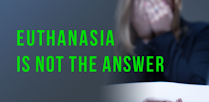Executive Director, Euthanasia Prevention Coalition
Sabrina Maddeaux and Tristan Hopper have both written excellent articles challenging Canada's euthanasia (MAiD) regime that were published in the National Post. Maddeaux focuses on the proposal to extend euthanasia to people with mental illnesswhile Hopper examines the issue how MAiD is becoming an option for Canada's poor.
Maddeaux refers to the proposal to extend euthanasia to people with mental illness alone as being a form of eugenics. Maddeaux gains our attention by beginning her article by stating:
For a nation that takes so much pride in our so-called universal health-care system, it’s ironic that we’ll soon be closer to offering universal death care than passable medicare.
Maddeaux explains that with the passing of Bill C-7, euthanasia for mental illness will become an option for Canadians in March 2023. Sadly, I believe that euthanasia for mental illness has already become an option, even though the rules for these deaths have not yet been established.
Maddeaux then points out the recent euthanasia death of the 51-year-old woman with chronic chemical sensitivities who only required better housing and then she writes about the recent story of a 31-year-old with chronic chemical sensitivities who was approved for MAiD.
Maddeaux then writes about the Abbotsford police investigation into the MAiD death of Donna Duncan.
Maddeaux then focuses on the problems with and lack of mental health care in Canada and states:
With mental illness poised for eligibility, the country is on the brink of sponsoring what essentially amounts to opt-in eugenics.
Maddeaus finishes her article by challenging the government's lack of mental health care and how MAiD is now becoming a way out of living with unacceptable conditions rather than a true choice. She writes:
But where this crosses from standard government neglect to a humanitarian issue is when MAID enters the equation. It’s one thing to fail the mentally ill — it’s quite another to kill them without offering them an effective alternative. Making access to death easier and cheaper than access to care renders the idea of real choice in the matter more twisted than a reflection in a fun-house mirror.
The legality and morality of MAID is rooted in a patient’s ability to consider all the options and make an informed decision — a process Canada has failed to adequately clarify and enforce, even before granting eligibility to the mentally ill.
If Canada is to expand MAID and become one of the world’s most permissive jurisdictions, it must ensure individuals have true autonomy. This necessitates providing the basic minimum standards of living and care to balance the scales against such a grave alternative. We cannot in good conscience become a nation where people are freer to die than they are to live without suffering.
Maddeaux is right in her assessment and yet today I was reading Twitter comments from Canada's euthanasia lobby and they are simply deadly and cruel with comments that questioning why people like us were concerned since, as they stated, MAiD is simply a "choice" even for the mentally ill.


2 comments:
As we age, how many of us think of EU as the complexity of life becomes more and more difficult. If a person cannot cope is that a mental illness.
Hello Mr. Schadenberg:
I find it virtually impossible to believe that people who have attained positions of high authority posit that being murdered by a stranger is "simply a choice" for the mentally ill, and are incapable of understanding a simple point of logic, to wit: PEOPLE WHO ARE MENTALLY ILL ARE MENTALLY ILL BECAUSE THEY HAVE BEEN DEPRIVED OF THEIR INSIGHT, THEREBY BECOMING TOTALLY INCAPABLE OF MAKING A "CHOICE."
I have decades of experience interacting with those who suffer from schizophrenia, including our own irreversibly afflicted fifty-one year old daughter. The one common characteristic which I have discovered among these people is that they all desperately want to LIVE, and spend every waking moment trying to elude the illusory hostile entities and forces which beset them. Lacking insight, they more often than not choose inappropriate and illogical strategies to do so.
We may well assume that a mentally ill person has jumped to his death from a cliff because he wished to end his life, whereas he was in fact desperately trying to save it, as he believed that he could escape from the monster who was about to kill him by flying to a nearby peak.
Please, don't liquidate our mentally ill because they are inconvenient.
Very much looking forward to finally meeting you in person at our Victoria March for Life later this month.
john simpson
Post a Comment